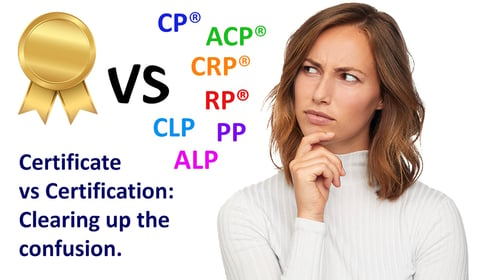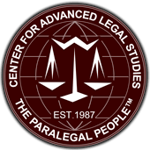 A paralegal certificate or degree is often required to qualify for paralegal job opportunities. Earning an academic credential significantly enhances employment opportunities for anyone seeking to diversify their career portfolio and showcase their qualifications for a legal position. Paralegals can obtain formal education through a training program like those available at Center for Advanced Legal Studies to earn a paralegal certificate or degree. Once paralegals have achieved a requisite level of education and experience, they may choose to seek a paralegal designation and become certified. Several national associations offer certification opportunities. However, paralegals who do not pursue certification through one of these associations are just as likely to enjoy long-term, career success. Paralegals are qualified to perform their responsibilities by completing an educational program, receiving training on the job, or through actual work experience.1 A distinct advantage exists for paralegals who begin their career by earning an academic credential. As they progress, certification can add value to the expertise previously acquired through education, training, and experience.
A paralegal certificate or degree is often required to qualify for paralegal job opportunities. Earning an academic credential significantly enhances employment opportunities for anyone seeking to diversify their career portfolio and showcase their qualifications for a legal position. Paralegals can obtain formal education through a training program like those available at Center for Advanced Legal Studies to earn a paralegal certificate or degree. Once paralegals have achieved a requisite level of education and experience, they may choose to seek a paralegal designation and become certified. Several national associations offer certification opportunities. However, paralegals who do not pursue certification through one of these associations are just as likely to enjoy long-term, career success. Paralegals are qualified to perform their responsibilities by completing an educational program, receiving training on the job, or through actual work experience.1 A distinct advantage exists for paralegals who begin their career by earning an academic credential. As they progress, certification can add value to the expertise previously acquired through education, training, and experience.
There are many paths to becoming a paralegal.2 For most, it starts with completing a specialized program and earning a certificate or degree in paralegal studies from a post-secondary institution before beginning their careers. Those already working as paralegals without first earning a certificate or degree can greatly increase career mobility and advancement opportunities by earning a paralegal credential. Regardless of the path that is taken, hiring potential and higher wages are often directly linked to educational attainment. Employers directly manage their hiring standards - and nearly all specify an educational component. There are no federal licensing regulations in place for paralegals. Currently, only California regulates its paralegals at the state level. Two other states have adopted rules in specified areas.3
Paralegals who want to further enhance their careers often seek certification. This is much different than pursuing a paralegal certificate. Earning a paralegal certificate and becoming a certified paralegal both have a place in entering and progressing in the paralegal profession, but there is a distinction between the two. One shows the acquisition of specialized knowledge through the completion of a focused paralegal course or program through a college or university. The other validates competency measured against standards held by a third-party paralegal association (after education and experience have been attained) – usually by way of an exam. Candidates holding a paralegal certificate have completed an educational program. However, this does not make them a certified paralegal.
A paralegal can hold a certificate and become certified – but these are two different things. Earning a paralegal credential makes becoming a certified paralegal possible. The industry term for holding a paralegal certificate is certificated not certified. What is the difference? Let’s clear up the confusion.
• “Certificated” paralegals have acquired practical knowledge and skills through coursework and have been awarded an academic credential in the form of a paralegal certificate from an educational institution. They have studied legal concepts in depth and had legal specialty training that enables them to enter and work successfully in the profession.
• “Certified” paralegals have been assessed, tested, and recognized by an independent national entity for skills acquired through ongoing education and experience. Each entity measures competencies against its exclusive standards through examination and has its own eligibility and renewal criteria.
A Paralegal Certificate is a law-based academic credential conferred through a college or university after completing an approved and accredited educational or training program. It provides evidence that an individual has a quantifiable understanding of the profession. Students may complete only legal specialty courses to earn a certificate, or they may add to their certificate work by enrolling in an advanced program to complete general education and additional courses to earn an associate degree, bachelor’s degree, or even a master’s degree. Paralegal certificate programs are often twofold. Designed primarily for entry-level students without an undergraduate degree, they can also benefit non-credentialed paralegals, or career changers with a degree, who are interested in a legal career. A certificate denotes the completion of specialized study. Degrees signify that specialized study culminated in a diploma.
Certification is a professional designation and service mark exclusively owned and granted by a national paralegal association. Service marks (trademarks) are attached to a specific brand identity associated with an independent certifying entity. There are several certification types, each retained by a different organization. Each organization has specific education and experience prerequisites, holds exclusive rights to its designations, and requires passing a test (or multiple tests) to use its certification designations. Only after passing a third-party examination administered by one of these entities, can a paralegal denote they are “certified” and use certification and certification abbreviations for that entity behind their names or in their titles. Individuals must meet all criteria of the certifying organization, and yearly continuing education is required to maintain certification. Paralegals may voluntarily pursue one or more designations to strengthen and support their professional development after they acquire the necessary education and experience. The three most common certifying paralegal organizations include:
- National Association of Legal Assistants – NALA owns the right to grant those it certifies to use the designation “Certified Paralegal” (CP®) and “Advanced Certified Paralegal” (ACP®); https://nala.org
- National Federation of Paralegal Associations – NFPA owns the right to grant those it certifies to use the designation “CORE Registered Paralegal” (CRP®) and “PACE Registered Paralegal” (RP®); https://www.paralegals.org
- National Association for Legal Support Professionals – NALS owns the right to grant those it certifies to use the designation “Accredited Legal Professional” (ALP), “Certified Legal Professional” (CLP), and “Professional Paralegal” (PP); https://www.nals.org
To start or further enhance your legal career, or to strengthen your qualifications for alternative paralegal career paths and certification, education is key. Specialized paralegal education is often a standard requirement for employers hiring paralegals and is typically a criterion for all certifying entities. To become certified, one must first earn a paralegal certificate, or have a combination of other education and substantive experience, to apply for certification. To recap:
|
“Certified” = Becoming a Certified Paralegal
|
At Center for Advanced Legal Studies, paralegal education is ALL we do, and it’s all we have done since 1987. We are experts in paralegal education and training and can prepare you for a successful and rewarding paralegal career. We teach to the highest standards and offer our accredited paralegal programs, including a Paralegal Certificate, a Paralegal Associate Degree, and a Bachelor of Arts: Law and Business nationwide. Contact us today at www.paralegal.edu to learn more!
1 https://www.americanbar.org/groups/paralegals/profession-information/information_for_lawyers_how_paralegals_can_improve_your_practice/
2 Bureau of Labor Statistics, U.S. Department of Labor, Occupational Outlook Handbook, Paralegals and Legal Assistants,
at https://www.bls.gov/ooh/legal/paralegals-and-legal-assistants.htm (visited February 18, 2024).
3 https://www.americanbar.org/groups/paralegals/profession-information/educational-information-for-paralegals/

|
Tami Riggs Director of Outreach and Career Services Tami has an extensive and varied professional background that spans criminal justice, paralegal education, and international school marketing and communication. Her career has been guided by a focus on developing strategic partnerships that facilitate school growth and student opportunities. She holds a Bachelor of Science in Degree in Criminal Justice from Texas State University. |












